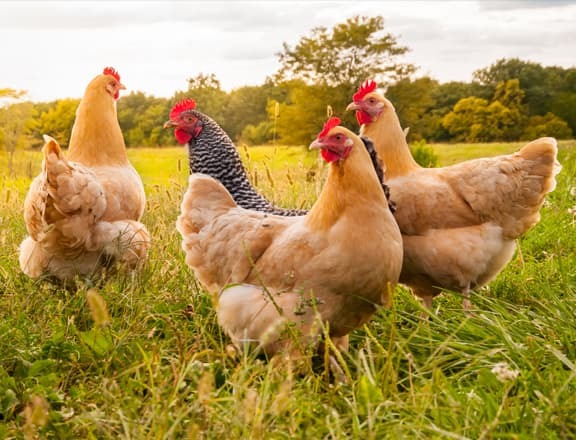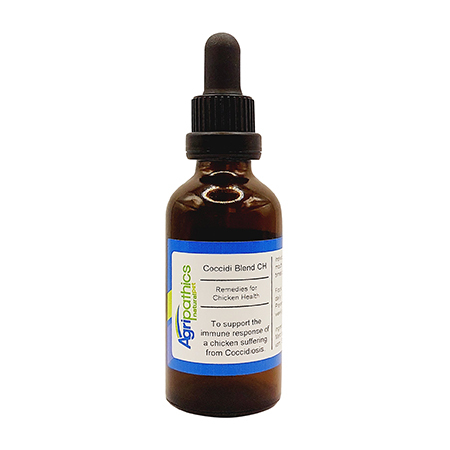Coccidiosis in Chickens: Signs, Symptoms, and Treatment
Coccidiosis in chickens is a significant concern for poultry keepers, as it poses a serious threat to the health of your flock. This parasitic disease, caused by the microscopic coccidia protozoa, targets the intestines of poultry, making early detection crucial. Understanding the signs and symptoms is key to mitigating the impact of coccidia in chickens and taking timely action for their treatment. Our reemdy Coccidi Blend CH can help with your flocks health.
What is Coccidiosis in Chickens?
Coccidiosis in chickens results from infection by coccidia parasites, which damage the intestinal lining. The condition is highly contagious and rampant in shared environments, such as coops. Young chicks are particularly susceptible, though chickens of any age can be affected.
Signs and Symptoms of Coccidiosis in Poultry
Early recognition of coccidiosis symptoms can prevent severe outcomes. Look out for these signs:
-
Diarrhoea, possibly with blood or mucus
-
Lethargy and reduced activity
-
Loss of appetite and noticeable weight loss
-
Ruffled feathers and pale combs
-
Stunted growth in young birds
-
Increased thirst, often due to dehydration
If left unchecked, these symptoms can worsen, causing critical intestinal damage and even mortality.
Treatment of Coccidiosis in Poultry
-
Isolate Affected Birds: If you notice any chickens showing signs of coccidiosis, it’s important to isolate them immediately to prevent the spread of the disease to other birds in the flock.
-
Clean and Disinfect the Coop: Coccidia can survive in the environment for long periods, so thoroughly cleaning the chicken’s living area is essential. Disinfect the coop and replace bedding with fresh, dry materials to reduce the risk of reinfection.
-
Supportive Care: Offer supportive care by providing fresh, clean water and high-quality feed to help your chickens recover. Electrolytes and probiotics can be added to water to aid in hydration and intestinal health.
-
Use Coccidi Blend CH: Coccidi Blend CH is a homeopathic remedy formulated specifically to help treat coccidiosis in chickens. This remedy can support the healing of the intestinal lining, reduce inflammation, and boost overall immune function. Administer Coccidi Blend CH as directed to support your flock’s recovery.
-
Medication (If Necessary): In severe cases, medication such as coccidiostats may be prescribed by a veterinarian to control the spread of the parasite. This should be used in conjunction with homeopathic remedies like Coccidi Blend CH for comprehensive treatment.
-
Monitor Progress: Keep a close eye on affected birds to track their recovery. As the symptoms improve, continue offering them proper care and hydration. Full recovery may take several weeks, depending on the severity of the infection.
Can Coccidiosis Kill Chickens?
If left untreated, coccidiosis can be fatal. The parasite damages the intestinal walls, leading to severe dehydration, nutrient malabsorption, and even organ failure. Early intervention is key to preventing death from this disease.
Natural Prevention and Management of Coccidiosis in Chickens
- Keep the Coop Dry and Clean: Regularly clean the coop and ensure proper drainage to prevent damp conditions that favour coccidia spread.
- Preventative Homeopathy: Continuously administer homeopathic Coccidi Blend CH to bolster the immune system and prevent disease outbreaks.
- Natural Dietary Additions: Integrate natural supplements into their diet, like apple cider vinegar and garlic, known for their anti-parasitic properties, to support gut health.
Coccidiosis in chickens can lead to severe consequences if not addressed promptly. By recognising symptoms early and incorporating both traditional and homeopathic treatment methods, including Coccidi Blend CH, you can safeguard your flock's health.
Maintaining proper coop hygiene and utilising natural preventive measures form the foundation of effective coccidiosis management. For personalised advice and more detailed information, feel free to contact us. Our goal is to assist you in keeping your chickens healthy and flourishing.
Recent Articles

20% Off
All Cat Remedies
Lorem Ipsum is simply dummy text of the printing and typesetting industry. Lorem Ipsum has been the industry's standard dummy text ever since the 1500s, when an unknown printer took a galley of type and scrambled it to make a type specimen book. Lorem ipsum dolor sit amet, consectetur adipiscing elit. Vivamus leo ante, consectetur sit amet vulputate vel, dapibus sit amet lectus.




 Earn loyalty points everytime you shop
Earn loyalty points everytime you shop
